语法讲解:过去分词作定语和表语
何韦(语法)过去分词作定语和表语

e.g.:How I regretted the hours
wasted in the woods!
e.g.: I like this kind of
wcleoathri.ng
clothes
made
of
e.g.:The books written by Mo Yan are popular.
e.hg.u:ndWreed’sllogfoyteoarvsisaitgtoh.e bridge built
She looked w_o_rr_ied.
IHaemw—ainstl_e—or_sets—itnedthinouthghetb. ook. The door remained l_oc_k_ed_.
• •
TThheeystgoortym—isa—erxrcieitdinfigv.eYyoeuaarsreage_xo_c. it_ed
一个受伤的手指 an injured finger 一枚破损的硬币 a broken coin 一支点燃的蜡烛 a lighted candle
注意:过去分词作定语时,有时只有 被动意义。
e.g. : spoken English英语口语
written exercises 书面练习
少数表示位移或状态改变的 不及物动词的过去分词只有完成的意义
• We were __b_o_r_e_d_(bore) at the football V-ginagm作e. 表语修饰物,翻译为“令人感到---”
V-ed 作表语修饰人,翻译为“感到---”P(17)
1. As we joined the big crowd , I got _____ from my friends
语法-过去分词作定语和表语

过去分词作定语和表语Q:神马是动词的过去分词?A:①②一、过去分词作定语。
①动词的过去分析作定语的意义;a respected guest a risen suna retired worker the broken glassconclusion: 过去分词作定语的意义是表& 。
②动词的过去分析作定语的位置;fallen leaves retired workers the risen sunThe computer centre, opened last year, is very popular among young people.The bridge built 2000 years ago is in good condition now.conclusion: 单个的过去分词作定语,往往放在被修饰的名词的;过去分词短语往往放在被修饰的名词的。
翻译下列短语或句子:一个被宠坏的孩子:一次有组织的旅行:交通事故造成的死亡:一本被英语老师写的书:③过去分词作定语与定语从句的关系。
We all like the lectures that are given by Mr. Song.=>We all like the lectures given by Mr. Song.译:The bridge which was built 2000 years ago is in good condition now.=> The bridge built 2000 years ago is in good condition now.译:conclusion:把定语从句中的和省去之后,便成为了;因此过去分词短语与定语从句可以。
把下列定语从句变为过去分词短语作定语,并翻译。
①Let’s try the bookstore that was opened last year.②Nine out of ten women who were interviewed about the product said they liked it.③Yesterday, the President went to visit the workers who had retired.④The United States is a country which has developed.⑤He told us the great wrong which had been done to him.⑥We must keep a secret of the things which is being discussed here.⑦Please tell me the subjects which will be discussed at the next meeting.EXERCISE:1.一直迷路的羊2.英语口语3.一名退休的教师4.发达国家5.鲁迅写的书很受欢迎PRACTICE:1.I found this plate on the floor. The plate was broken in pieces.2.I looked at that modern abstract(抽象的) painting. It was colored in yellows and greens.3.Yesterday I got the answer to my question on the Internet. It was the one I expected.4.She is one of my friends. She is devoted to my interests.5.On the doorstep I found a lot of bottled. They were marked in green ink.6.We saw many windows in that room. They were all cracked.二、过去分词作表语。
过去分词作定语和表语

如果遇到复杂的句子结构,可以先简化句子,找出主干部分,再逐步添加 其他成分。
THANKS
表示状态、性质或特征描述
状态描述
过去分词可以表示主语所处的 状态,如“The window is
broken.”(窗户破了。)中 的“broken”表示窗户的状态。
性质描述
过去分词可以描述主语的性质, 如“She is interested in
music.”(她对音乐感兴趣。) 中的“interested”表示她的 性质。
01
观察句子结构,确定过去分词 短语在句中的作用,是作为定 语还是表语。
02
如果是定语,需要判断其与所 修饰名词之间的关系,主动关 系用现在分词,被动关系用过 去分词。
03
如果是表语,需要注意与主语 的逻辑关系,以及时态和语态 的一致性。
技巧二:注意时态、语态和主谓一致问题
在使用过去分词作定语或表语时,需要注意句子的时态和语态,确保过去 分词的形式与句子的时态和语态相符。
在使用过去分词时,需要结合具体的语境进行判断。通过分析上下文语境和逻辑关系,可以更准 确地理解句子的意思并选择合适的表达方式。
06
实战演练与技巧分享
练习题:识别并改正错误使用过去分词现象
错题1
The book, written by a famous writer, are very popular.
05
常见误区及注意事项
混淆现在分词与过去分词形式
要点一
误将现在分词用作定语
现在分词具有主动意义,表示动作正在进行或与谓语动作 同时发生,而过去分词则表示被动或完成意义。因此,在 需要表示被动或完成意义时,应使用过去分词而非现在分 词。
高中英语过去分词做定语表语的语法讲解
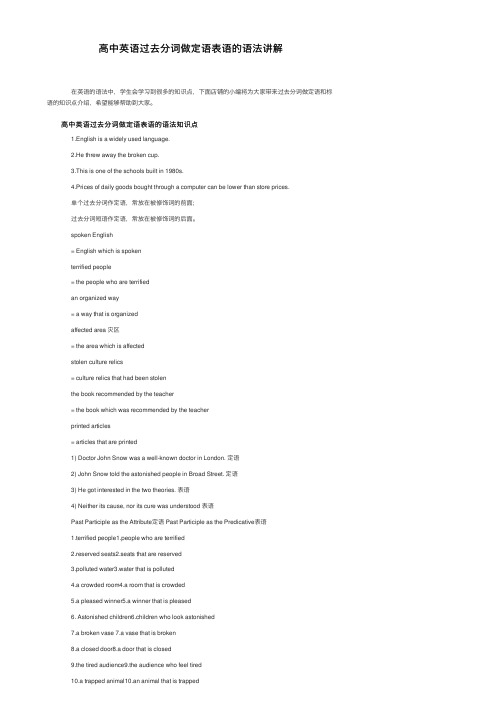
⾼中英语过去分词做定语表语的语法讲解 在英语的语法中,学⽣会学习到很多的知识点,下⾯店铺的⼩编将为⼤家带来过去分词做定语和标语的知识点介绍,希望能够帮助到⼤家。
⾼中英语过去分词做定语表语的语法知识点 1.English is a widely used language. 2.He threw away the broken cup. 3.This is one of the schools built in 1980s. 4.Prices of daily goods bought through a computer can be lower than store prices. 单个过去分词作定语,常放在被修饰词的前⾯; 过去分词短语作定语,常放在被修饰词的后⾯。
spoken English = English which is spoken terrified people = the people who are terrified an organized way = a way that is organized affected area 灾区 = the area which is affected stolen culture relics = culture relics that had been stolen the book recommended by the teacher = the book which was recommended by the teacher printed articles = articles that are printed 1) Doctor John Snow was a well-known doctor in London. 定语 2) John Snow told the astonished people in Broad Street. 定语 3) He got interested in the two theories. 表语 4) Neither its cause, nor its cure was understood 表语 Past Participle as the Attribute定语 Past Participle as the Predicative表语 1.terrified people1.people who are terrified 2.reserved seats2.seats that are reserved 3.polluted water3.water that is polluted 4.a crowded room4.a room that is crowded 5.a pleased winner5.a winner that is pleased 6. Astonished children6.children who look astonished 7.a broken vase 7.a vase that is broken 8.a closed door8.a door that is closed 9.the tired audience9.the audience who feel tired 10.a trapped animal10.an animal that is trapped There are many fallen leaves on the ground. = There are many leaves which had fallen on the ground. (地上有许多落叶) Some of them, born and brought up in rural villages, had never been to Beijing. = Some of them , who had been born and brought up in rural villages, had never been to Beijing. (他们中的⼀些⼈,在农村出⽣并长⼤,从没去过北京) 及物动词的过去分词表⽰结束了的被动动作或者没有⼀定的时间性,只表⽰被动关系。
语法过去分词作定语和表语

A of the ___ speech, started to 10. Mr Smith, ____ read a novel. A. tired; boring B. tiring; bored C. tired; bored D. tiring; boring
1. _____________ (开水) 2. ________________ (一个破碎的茶杯) 3. three ____________________ (受伤的士兵) 4.We lived in the house __________________ (我舅舅们修建的). 5. Any medicine ________(服用) without the advice of a doctor can cause trouble. 6. We spent two hours discussing the plan ____ ______________ (她制定的).
Attention:过去分词修饰 something, everything, anything, nothing, somebody, nobody等不定代词和 指示代词those 时,要放在这些词后面。 Nothing reported ( in the newspaper) interested
语法功能 过去分词或过去分词短语作定语时,其功能相当于一
个定语从句。
3)过去分词与现在分词作定语的区别:
• the changing world • the changed world • boiling water • boiled water
(正在变化的) (变化了的) (正在沸腾的) (已经沸腾过的)
Past paticiple
分词有两种:现在分词和过去分词
过去分词的用法讲解

过去分词的用法讲解过去分词的用法在英语语法中很是普遍。
那么,如何正确的使用过去分词呢?我们来看看过去分词的用法解析,只有了解了过去分词的用法,才能正确的运用和使用它。
一、基本概念1.分词的定义动词的-ed分词即过去分词,是由动词的过去分词构成,一般只有一种形式。
2.过去分词的语法作用:过去分词一方面具有动词的性质,另一方面也相当于一个形容词或副词,在句中可以作表语、定语、状语和补足语。
1)过去分词作表语,主要表示主语的心理感觉或所处的状态。
如:Don' t touch ihe glass because it is broken.不要碰那个杯子,它是坏的。
He is quite pleased with the design of the dress.她很喜欢那礼服的式样。
2)过去分词做定语:单个的过去分词作定语一般放在名词的前面,相当于一个定语从句。
如:The excited people rushed into the building.激动的人们奔进了大楼°We need more qual ified teachers.我们需要更多合格的教师。
过去分词短语作定语通常放在被修饰的词后面,相当于一个定语从句。
如:Is there anything planned for tomorrow?明天有什么活动吗?The suggestion made by the foreign expert was adopted by the manager.夕卜国专家提出来的建议被经理采纳了。
过去分词作定语也可用作非限制性定语,前后用逗号隔开。
如:The books, written by Lu Xun, are popular with many Chinese people.这些书是鲁迅写的,受到了许多中国人民的喜爱。
The meeting, attended by one thousand students, was a success.这次会议获得很大的成功,共有一千个学生出席了。
过去分词作定语,表语,宾语补足语
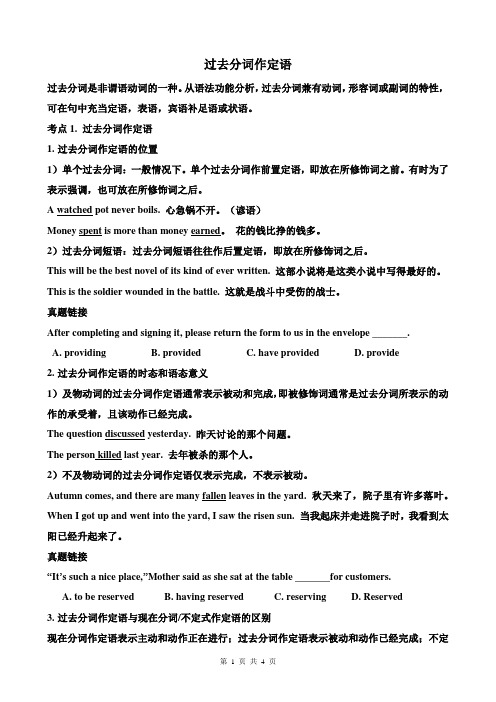
过去分词作定语过去分词是非谓语动词的一种。
从语法功能分析,过去分词兼有动词,形容词或副词的特性,可在句中充当定语,表语,宾语补足语或状语。
考点1. 过去分词作定语1.过去分词作定语的位置1)单个过去分词:一般情况下。
单个过去分词作前置定语,即放在所修饰词之前。
有时为了表示强调,也可放在所修饰词之后。
A watched pot never boils. 心急锅不开。
(谚语)Money spent is more than money earned。
花的钱比挣的钱多。
2)过去分词短语:过去分词短语往往作后置定语,即放在所修饰词之后。
This will be the best novel of its kind of ever written. 这部小说将是这类小说中写得最好的。
This is the soldier wounded in the battle. 这就是战斗中受伤的战士。
真题链接After completing and signing it, please return the form to us in the envelope _______.A. providingB. providedC. have providedD. provide2.过去分词作定语的时态和语态意义1)及物动词的过去分词作定语通常表示被动和完成,即被修饰词通常是过去分词所表示的动作的承受着,且该动作已经完成。
The question discussed yesterday. 昨天讨论的那个问题。
The person killed last year. 去年被杀的那个人。
2)不及物动词的过去分词作定语仅表示完成,不表示被动。
Autumn comes, and there are many fallen leaves in the yard. 秋天来了,院子里有许多落叶。
When I got up and went into the yard, I saw the risen sun. 当我起床并走进院子时,我看到太阳已经升起来了。
Book5 unit1_语法-过去分词作定语和表语

过去分词做表语、定语
Revision V-ing form
一、动词-ing形式作表语
1 表示主语的内容 ,可以转换到句首作主语 Her job is keeping the classroom as clean as possible. (= Keeping the classroom as clean as possible is her job) 2 表示主语具有的特征、性质和状态(动词ing 相当一 个形容词) The story is quite interesting. This book is very boring.
该题考查分词作表语的用法。“to
pay sb. by the hour” 计时给某人报酬。 此题被动结构作表语。类似的有:get burnt, get hurt , get wounded.
• What he has done is really ____.Now C his parents are _____ him. A. disappointing; B. disappointing; C. disappointing; D. disappointed; disappointed at disappointed about disappointed with disappointing by
现在分词与过去分词区别 1.语态上
现在分词: 表示主动的动作
过去分词: 表示被动的动作
I heard someone opening the door . I heard the door opened .
现在分词: 表示正在进行的动作
2.时间上
过去分词: 表示已经完成的意思
语法过去分词作表语、定语、补语

一名逃跑的囚
3. 过去分词作定语
位置
English is a widely used language. This is one of the schools built in 1980s.
单个过去分词作定语,常放在被修饰词的 前面;过去分词短语作定语,常放在被修饰 词的后面。
2、过去分词短语作后置定语,表示被动和/ 或完成意义。
We’ll go to visit the bridge built hundreds of years ago.
我们要去看那座建于几百年前的桥。
现在分词和过去分 词做定语,有何区 别呢?
区别
1. The woman ____a lesson is our teacher.
A. giving
B. given
①过去分词做定语:表被动,表完成。 ②现在分词作定语:表主动,表进行。
小试
1. Did you attend the meeting ___C___yesterday?
A. to be held
B. having been held
C. held
D. being held
2. I borrowed a book __A____ by Mark Twain from
Book 5 Unit 1 Grammar
过分做表语、定语、补语
1. 过去做定语
1. 惊恐的人们 2. 被污染的水 3. 拥挤的教室 4. 打碎的花瓶 5. 关了的门
1. terrified /astonished people 2. polluted water 3. a crowded room 4. a broken vase 5. a closed door
过去分词作定语和表语

过去分词作定语和表语过去分词作定语和表语过去分词是⾮谓语动词的⼀种形式,表⽰动作的被动和完成,在句中可做定语、状语、表语和宾语补⾜语。
这⾥主要讲解过去分词作定语和表语。
⼀、过去分词作定语1.过去分词作定语的位置(1)单个的过去分词作定语,通常放在被修饰的名词之前。
The broken clock should be repaired as soon as possible.这个坏了的钟表应该尽快修好。
The injured workers are now being taken good care of in the hospital.受伤的⼯⼈正在医院受到良好的照料。
(2)过去分词短语作定语时,通常放在被修饰的名词之后,它的作⽤想当与⼀个定语从句。
This will be the best novel of its kind ever written.这将是这类⼩说中写得最好的。
提醒:(1)有些单个的过去分词,在习惯上往往放在被修饰词后⾯。
There is little time left, let’s hurry up.剩余的时间不多了,我们赶快吧。
②过去分词修饰代词时,应置于被修饰词之后。
He is one of those invited.他是那些被邀请的⼈之⼀。
③有些过去分词作定语,前置和后置意义不同。
试⽐较:this is a used car.这是⼀辆旧车。
The method used is very efficient.所⽤的这个⽅法很有效。
2.过去分词作⾮限制性定语。
过去分词作⾮限制性定语,⽤来补充说明被修饰词的情况,前⾯常⽤逗号与被修饰的成分隔开。
A girl, dressed like a student,came in and sat beside me.⼀位学⽣打扮的⼥孩⾛进来,坐在我的旁边。
3.过去分词作定语时的意义不及物动词的过去分词作定语,只表⽰动作已完成,不表⽰被动的意义;及物动词的过去分词作定语表⽰被动意义或已经完成的被动动作。
21-22版:Grammar——过去分词作定语和表语(创新设计)
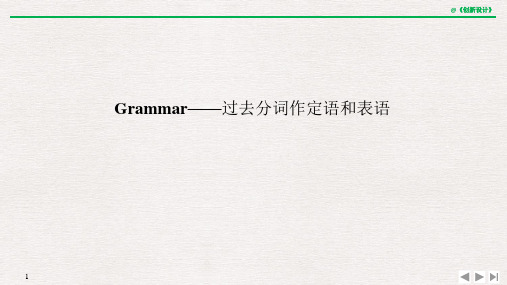
@《创新设计》
【名师指津】 有些过去分词表示特定含义时,单独作定语也可放在所修饰的名词 之后,如left(剩余的),given(所给的),concerned(有关的)等。 There’s little time left.Let’s hurry up. 剩余的时间不多了,我们快点吧。
4
@《创新设计》
The high-speed railway to be built next month leads to Kunming. 下个月将要建造的高铁通向昆明。
8
@《创新设计》
二、过去分词作表语 1.过去分词作表语时的意义和用法
过去分词可放在连系动词be,get,feel,remain,seem,look,become等之后作表 语,表示主语所处的状态。 I was disappointed at the film I saw last night. 我对昨晚看的电影很失望。 He seemed quite delighted at the news. 听到那个消息他似乎很高兴。
6
3.过去分词与现在分词作定语的区别
@《创新设计》
形式
意义
语态
时态
过去分词
被动
完成
现在分词
主动
进行
As we all know,China is a developing country,while America is a developed country.众所周知,中国是一个发展中国家,而美国是一个发达国家。
11
【名师指津】 常用的这类词有:
exciting 令人激动的 astonishing 令人惊讶的
excited
激动的;兴奋的astonished
过去分词作表语和作定语的用法区别
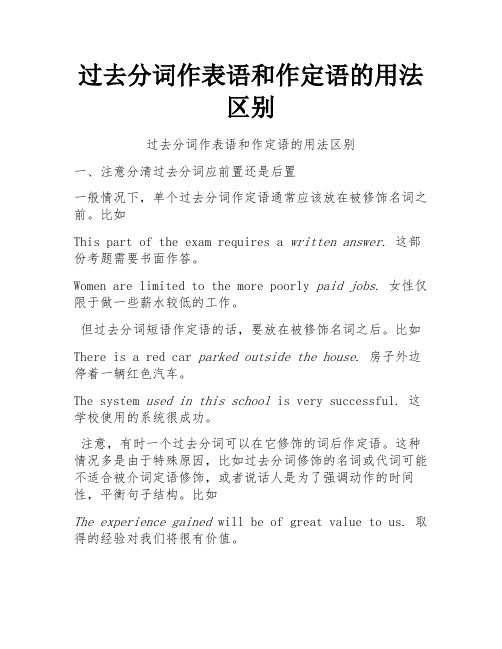
过去分词作表语和作定语的用法区别过去分词作表语和作定语的用法区别一、注意分清过去分词应前置还是后置一般情况下,单个过去分词作定语通常应该放在被修饰名词之前。
比如This part of the exam requires a written answer. 这部份考题需要书面作答。
Women are limited to the more poorly paid jobs. 女性仅限于做一些薪水较低的工作。
但过去分词短语作定语的话,要放在被修饰名词之后。
比如There is a red car parked outside the house. 房子外边停着一辆红色汽车。
The system used in this school is very successful. 这学校使用的系统很成功。
注意,有时一个过去分词可以在它修饰的词后作定语。
这种情况多是由于特殊原因,比如过去分词修饰的名词或代词可能不适合被介词定语修饰,或者说话人是为了强调动作的时间性,平衡句子结构。
比如The experience gained will be of great value to us. 取得的经验对我们将很有价值。
We couldn’t agree on any of the problems discussed. 我们未能就所讨论的任何问题达成协议。
二、注意分清用过去分词还是现在分词有些成对使用的过去分词和现在分词(如interested与interesting),从用法上看,它们虽然是分词的形式,但具有形容词的特点,都可用作表语和定语,注意它们在用法上的区别:过去分词通常用于说明人自身的感受,通常译为“(人)感到……的”;而现在分词则通常用于说明事物给人的感受,通常译为“令人感到……的”。
如:Interested members will meet at two. 感兴趣的会员两点钟碰头。
The English language has an interesting history. 英语有一段有趣的历史。
过去分词的用法
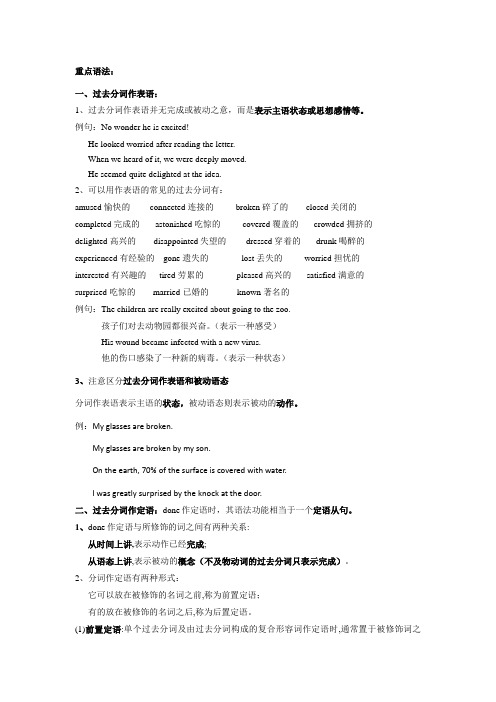
重点语法:一、过去分词作表语:1、过去分词作表语并无完成或被动之意,而是表示主语状态或思想感情等。
例句:No wonder he is excited!He looked worried after reading the letter.When we heard of it, we were deeply moved.He seemed quite delighted at the idea.2、可以用作表语的常见的过去分词有:amused 愉快的 connected 连接的 broken 碎了的 closed 关闭的completed 完成的 astonished 吃惊的 covered 覆盖的 crowded 拥挤的delighted 高兴的 disappointed失望的 dressed 穿着的 drunk 喝醉的experienced 有经验的 gone 遗失的 lost 丢失的 worried 担忧的interested 有兴趣的 tired 劳累的 pleased 高兴的 satisfied 满意的surprised 吃惊的 married 已婚的 known 著名的例句:The children are really excited about going to the zoo.孩子们对去动物园都很兴奋。
(表示一种感受)His wound became infected with a new virus.他的伤口感染了一种新的病毒。
(表示一种状态)3、注意区分过去分词作表语和被动语态分词作表语表示主语的状态,被动语态则表示被动的动作。
例:My glasses are broken.My glasses are broken by my son.On the earth, 70% of the surface is covered with water.I was greatly surprised by the knock at the door.二、过去分词作定语:done作定语时,其语法功能相当于一个定语从句。
高中英语语法中过去分词作定语和表语

高中英语语法中过去分词作定语和表语发布时间:2006-10-10 13:41:00 | 信息来源: | 浏览:过去分词作定语和表语过去分词作定语,在语态上,表被动;在时间上,表示动作已经发生或完成,与它所修饰的名词有逻辑(意义)上的动宾关系。
过去分词作定语时,所修饰的名词在逻辑上相当于被动句中的主语,过去分词相当于谓语。
过去分词作定语表示动作在谓语动作之前发生,已经完成并具有被动意义。
有时也不表示时间性。
作定语的过去分词一般由及物动词变来,因为只有及物动词才有被动意义。
例如:He is a teacher loved by his students. 他是个很受学生爱戴的老师。
也有用不及物动词的过去分词作定语的情况,一般作前置定语,它不表示被动意义,只表示主动意义,强调动作完成。
不能像及物动词的过去分词那样放在名词后面作定语。
例如:fallen leaves 落叶retired workers 退休工人the risen sun 升起的太阳注意下面过去分词作定语的几种情况:1. 单个的过去分词作定语一般放在被修饰的名词之前。
例如:We needed much more qualified workers. 我们需要更多的合格的工人。
My friend is a returned student. 我的朋友是个归国的留学生。
单个分词也可以作后置定语,用以强调动作。
例如:They decided to change the material used. 他们决定更换使用的材料。
2. 过去分词短语作定语要放在被修饰的名词后面,作后置定语,其作用相当于一个定语从句。
例如:The student dressed in white is my daughter.=The student who is dressed in white is my daughter.)穿白色衣服的学生是我的女儿。
3. 如果被修饰的词是由every/some/any/no + thing/body/one所构成的复合代词或指示代词those等时,即使一个单一的分词作形容词用,也要放在被修饰词的后面。
过去分词做定语和表语

语
名称 不定 式 动名 词 现在 分词 过去 主语 √ √ 宾 语 √ √ √
法
表语 √
功
能
宾语 定语 状语 补足 语 √ √ √ √
√ √
√ √
√ √
√ √
时态:完成 语态:被动
1.作状语 2.作定语 3.作表语 4.作补语
过 去 分 词
具有形容词和副词的特征
课文原句:想一想划线的过去分词充当什么成分
3. 变化类: turn , become, fall ,get, go, grow,
4. 似乎类: appear, seem
5. 保持类: remain, , stay, keep, ……………..
注意:过去分词作表语,构成的系表结 构与被动语态的区别: 过去分词作表语,强调特点或状态; 而被动语态中,强调动作。 e.g.:This shop is now closed.
Trห้องสมุดไป่ตู้nslation:
1. 丢了钱他困惑不已。 got puzzled He ______________ about losing the money.
2、你为什么总是看上去很疲劳?这些日子睡得 好吗? look so tired Why do you always _____________ ? Do you sleep well these days?
过去分词做定语和表语
实意动词/行为动词(vt./vi) run sing learn say write
动 词
谓语动词
连系动词 am is are was were look sound seem get turn 助动词 do does did have has will 情态动词 can may must need dare 不定式 ( to do )
英语语法——过去分词作定语和表语
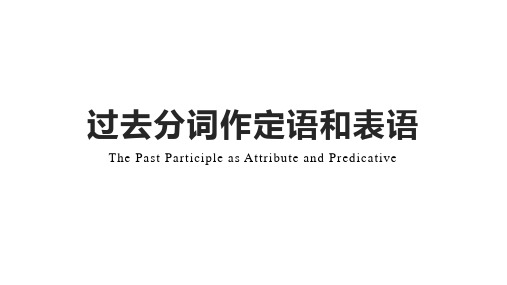
Past Participle
—— 过去分词(v+ed) 表被动/完成 及物动词vt.:被动+完成——polluted river 不及物动词vi.:完成——fallen leaves
过去分词作定语和表语
The Past Participle as Attribute and Predicative
基本句式
基本句式
主谓 I cry/run. 主谓宾 I play basketball.
句子必定有谓语
一个句子一个谓语
主系表 I am a student.
She asks me a question., stands in front of me.
P.P as Attribute
Exercise
把句子转化成定语从句: (1) It came from the river polluted by the dirty water from London. It came from the river which was polluted by the dirty water from London. (2) Zhong Nanshan awarded Medal of the Republic on September 8th did great contribution in the fight with Covid-19. Zhong Nanshan who was awarded Medal of the Republic on September 8th did great contribution in the fight with Covid-19.
38.过去分词作定语、表语和宾语补足语
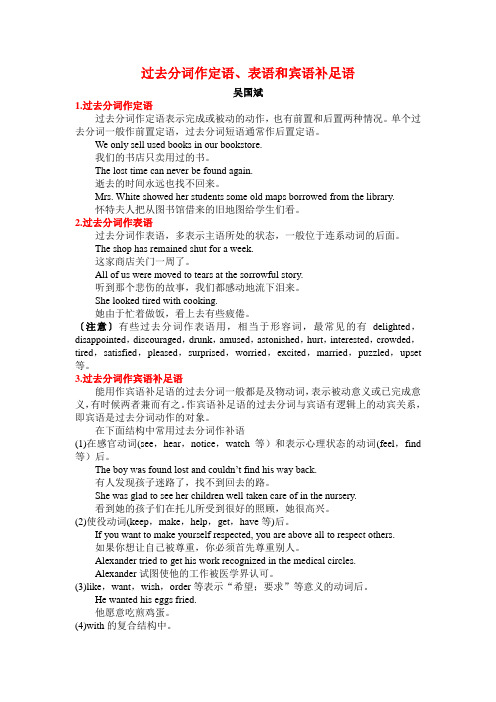
过去分词作定语、表语和宾语补足语吴国斌1.过去分词作定语过去分词作定语表示完成或被动的动作,也有前置和后置两种情况。
单个过去分词一般作前置定语,过去分词短语通常作后置定语。
We only sell used books in our bookstore.我们的书店只卖用过的书。
The lost time can never be found again.逝去的时间永远也找不回来。
Mrs. White showed her students some old maps borrowed from the library.怀特夫人把从图书馆借来的旧地图给学生们看。
2.过去分词作表语过去分词作表语,多表示主语所处的状态,一般位于连系动词的后面。
The shop has remained shut for a week.这家商店关门一周了。
All of us were moved to tears at the sorrowful story.听到那个悲伤的故事,我们都感动地流下泪来。
She looked tired with cooking.她由于忙着做饭,看上去有些疲倦。
〔注意〕有些过去分词作表语用,相当于形容词,最常见的有delighted,disappointed,discouraged,drunk,amused,astonished,hurt,interested,crowded,tired,satisfied,pleased,surprised,worried,excited,married,puzzled,upset 等。
3.过去分词作宾语补足语能用作宾语补足语的过去分词一般都是及物动词,表示被动意义或已完成意义,有时候两者兼而有之。
作宾语补足语的过去分词与宾语有逻辑上的动宾关系,即宾语是过去分词动作的对象。
在下面结构中常用过去分词作补语(1)在感官动词(see,hear,notice,watch等)和表示心理状态的动词(feel,find 等)后。
- 1、下载文档前请自行甄别文档内容的完整性,平台不提供额外的编辑、内容补充、找答案等附加服务。
- 2、"仅部分预览"的文档,不可在线预览部分如存在完整性等问题,可反馈申请退款(可完整预览的文档不适用该条件!)。
- 3、如文档侵犯您的权益,请联系客服反馈,我们会尽快为您处理(人工客服工作时间:9:00-18:30)。
3) The question discussed was very important.
= The question _w_h_i_c_h_h_a_d_b_e_e_n_d_i_s_cu__ss_e_d____ was very important.
二、过去分词作表语
1、过去分词作表语,表示主语的特点或所处 的状态,其前的系动词有包括be在内的多种 形式。
e.g.:spoken English
英语口语
written exercises 书面练习
少数表示位移或状态改变的不及物动词的过去分词 只有完成的意义
fallen leaves
落叶
the risen sun
升起来的太阳
a returned student
一名留学生
a retired teacher一名退休来自师Key points
• “-ed” can be used as _a_t_tr_i_b_u_te_ and be put before or after the noun that it modifies. eg. tired/exhausted/excited boy a boy called Tom
e.g.:The books written by Lu Xun are popular. 鲁迅写的书很受欢迎
We’ll go to visit the bridge built hundreds of years ago.
我们要去看那座建于几百年前的桥。
想一想
• 什么时候用前置定语? • 什么时候用后置定语?
e.g. : Everyone present is very inspired at his speech. 听了他的发言,在场的所有人都很振奋。
You seem frightened. 你似乎受了惊吓。
系动词
• appear, • be, become, • feel, • get, grow, • look, • prove, • Remain, • seem, smell, sound, stay, • taste, turn
Grammar
past participle used as
Grammar the attribute & the predicative
Task one
Look at the following story and find the usage of past participle (“-ed”)
an escaped prisoner 犯
一名逃跑的囚
2、过去分词作后置定语,表示被动和/或完 成意义。
e.g.:How I regretted the hours wasted in the woods!
我多懊悔在树林浪费的时光啊! I like wearing clothes made of this kind of cloth. 我喜欢穿这种布料做的衣服。
• He became interested in two theories that possibly explained how cholera killed people.
• He was determined to find out why.
一、过去分词作定语
3. 过去分词可作非限制性定语,相当于省略 式的定语从句。 e.g ① The books, (which were) written by Lu Xun, were very popular. ② The bridge, (which was) built in 1999, is very beautiful.
一、过去分词作定语
1、单个的过去分词作定语时一般兼有被动和完成 的意义。
eg:a lost animal
一只迷路的动物
a used stamp
一枚用过的邮票
an injured finger 一个受伤的手指
a broken coin
一枚破损的硬币
a lighted candle 一支点燃的蜡烛
注意:过去分词作定语时,有时只有被动意义。
Story
• A boy called Tom went to the cinema one night. It was a horror film, but he was interested in it. Sometimes he felt excited, sometimes he felt frightened. After the film, the tired boy came back home. Once home, the exhausted boy…
单个的过去分词作定语一般放在被修饰的 名词前
过去分词短语作定语要放在被修饰的名词 后面
Task two
Please find more examples in the reading passage of each usage.
Attribute
• So many thousands of terrified people died …
cholera. • He found that it came from the river
polluted by the dirty water from London.
Predicative
• But he became inspired when he thought about help ordinary people exposed to cholera.
• “–ed” can also be put after the linkverbs (be, feel, become, get, seem…) and used as _p_r_e_d_ic_a_ti_v_e_ . eg. be interested in feel excited/frightened
• …soon the affected person died. • He immediately told the astonished
people in Broad Street … • …that polluted water carried the virus. • …help ordinary people exposed to
